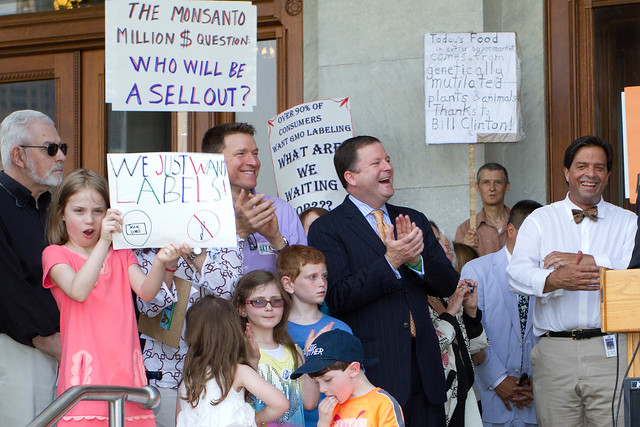This morning, I found an exciting piece of news in my inbox: “Connecticut Passes Nation’s First GMO Labeling Law“! That should be a cause of celebration, especially after the industry-financed defeat of a similar law in the California polls. However, wait until you hear all the stipulations attached to the bill. The main big catch: Connecticut’s bill won’t enter into force until at least four other states from the Northeastern region (spanning New England as well as New York, New Jersey and Pennsylvania) also adopt a labeling provision. The entire population covered by such laws must amount to 20 million people. And at least one of the other states has to border Connecticut (meaning it would have to be Rhode Island, Massachusetts or New York). Um, what?

Image by SRO Photos, via Flickr CC.
If you look closer into it, the lawmakers’ reasoning makes sense from a certain point of view. As this article points out, smaller states are terrified that the biotech and food processing industry would sue them for similar provisions in lawsuits they could not afford. This was one of the main reasons that the Vermont legislature stalled a labeling project that was well underway (though the House ended up passing a law that is waiting for the next State Senate session to be continued there). Waiting for a critical mass to develop makes sense in that you avoid being the scapegoat state that would have to actually engage in the landmark litigation to determine whether state-level labeling initiatives are constitutional or not.
When implemented, the bill will require the labeling of all genetically engineered foods, as per the following definition: “food that is intended for human consumption and seed that is intended to produce food for human consumption, which has been genetically altered by scientists to improve its ability to grow in non-native environments, resist pests, tolerate extreme weather conditions, produce more food (like milk in cows), or show other desired traits. GMOs found in these genetically engineered foods are created by scientists and cannot occur in nature or in traditional crossbreeding.”
Speaker of the House Brendan Sharkey (D-Hamden) argued that the bill was an appropriate compromise between consumers’ right to know and possible legal consequences: “Today is a significant victory in the fight to know what is in the food we eat and what we feed to our families,” he said. “Connecticut will be the first state in the nation to pass a GMO labeling law and this sets the stage for other states to join the growing movement to give consumers more choices. As a small state, Connecticut couldn’t go it alone – this compromise strikes the right balance.”
Yet, the provisions also mean that the implementation of the Connecticut bill is highly dependent on the success of lobbying efforts in other states, as seen a couple of days ago in the New York State Assembly. There, a similar GMO labeling bill was defeated in committee, with a lobbyist for the Council for Biotechnology Information, which represents genetically modified food giants Monsanto and DuPont, in attendance. According to Rebecca Spector, West Coast director for the Center of Food Safety,
“there was heavy industry lobbying at the last minute. When they counted, they had the votes in the committee, and at the last minute, two committee members switched their votes. We’re still waiting to find out which two.”
It is expected that Assemblywoman Linda Rosenthal, the bill’s main sponsor, will try to reintroduce and bring it for a vote before the end of the legislative session. However, session already ends on June 20th, so time is short.
More bills have already been introduced in almost half of all U.S. States – the Center for Food Safety has an uptodate list of all bills here.
Do you think that Connecticut should have gone for it by itself or that legislators made a wise choice in waiting for more leverage to avoid litigation?
I don’t see labeling as particularly useful. ‘Non-GMO’ is even less meaningful a term than ‘Organic’, and will only serve to further mislead the poorly informed public about what food is more or less healthy/ethical/sustainable. Whether to improve health or agriculture, GMOs have massive potential produce positive change, of course, that’s more likely to happen if those changes are profitable…
As for deferring and waiting on other states, it seems like a prudent decision from how you’ve explained it, though it does say some scary things about the US justice system, if states fear enacting policies that reflect the wishes of their population for fear of reprisals from corporations.
I definitely see your point, Alan! While I am on the fence on the health aspect of GMO-based foods, I do feel that consumers have the right to know – people might decide to eschew products that contain GMOs for other reasons as well, including to boycott certain corporations and practices. Proper, balanced education about the good and bad of gentech would of course be necessary (already is now) for labels to work effectively. And ditto on your last point about the justice system – it’s scary to think that states are afraid of litigation just because they know that companies have so much more cash and lawyers at hand than a public institution…